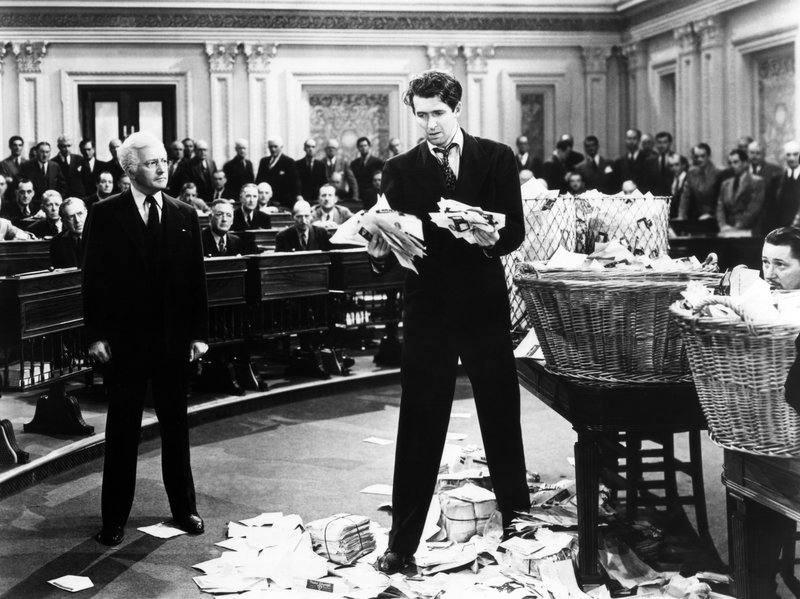A Flaw That Has Come to Define American Democracy
Jimmy Stewart in Mr. Smith Goes to Washington, courtesy of NPR.
A motion in the United States Senate fails to receive a finalizing vote. Despite the fact that millions of Americans depended on the passing of that motion, the voice and votes of the minority decided the ultimate fate of the legislation. Clearly, one can describe the entire situation as the application of ‘pirate’ tactics — a statement that actually is the epitome of the current political environment of the United States.
In the political environment of today, politicians benefit from appealing to their base so that they increase their likelihood of being reelected. Appealing to their base also has another effect, as it, according to analysis done by Fivethirtyeight, overwhelmingly convinces the voters of the politician to stick to the same political party in lower-level races. The significance of that effect is crucial in understanding how to potentially soften the barriers of partisanship that have, as seen in the events of January 6th, 2021, led to the beginnings of major violence.
‘Hitting the nuclear option’ is a phrase that is unique in the language of the United States Senate, and according to the Associated Press, it can in short be described as the accumulation of vexation by the political party in the majority from the disruptive tactics, or filibusters, of the minority. To give some context, the word ‘filibuster’ originates from the Dutch word ‘vrijbuiter,’ which means ‘pirate,’ and it is not a misnomer in any sense of the word. Starting from 1806 onward, Senators could rock the flow of the Senate procedure by speaking on the Senate floor for however long they wanted — provided they can take the physical strain of talking for hours on end. This, as expected, launched tsunamis into the structure of the Senate, with any piece of legislation requiring all Senators to believe debate was over in a way that invited a dysfunctional legislative body for centuries.
Such a development that thwarts the flow of democracy, one might wonder, could not possibly be protected by the American Constitution. However, as the Senate website describes, the Constitution leaves it up to each body of the bicameral legislature to decide its own rules, meaning as long as there is a majority vote to vote ‘nay,’ any motion to get rid of it would fail. Notably, because there has always been the needed votes to keep the filibuster, some people have a tendency to believe that the Senate was intentionally structured to ‘cool’ the filibuster-less legislation from the House of Representatives. This is not accurate, mostly because the House of Representatives got rid of their filibuster due to its vast membership and because Senators were not originally elected directly by the people — they were appointed by the State Legislature.
To comprehend today’s partisan gridlock in the Senate, one needs to look at why the filibuster was initially introduced. According to the Washington Post, the Vice President in 1805, Aaron Burr, proposed an amendment that would try to significantly simplify the rules of the Senate by eliminating a simple-majority vote procedure that would end any debate and start a final vote. Essentially, it meant that any final vote needed to have the consent of all the Senators in the chamber, and any one could prevent the motion from being voted on by looking to filibuster. In the opinion of former President Woodrow Wilson, needing unanimous approval of a vote was too difficult of a task to achieve in a ninety-six person senate, and in 1917 he proposed a new procedure labeled ‘Rule 22’ or ‘cloture,’ where debate could be ended by a supermajority, or two-thirds of the Senate agreeing to vote. President Wilson wanted to use cloture to pass the needed legislation to act on the political climate of World War I, but future presidents, because of the location of political ideologies, have not had the same fortune in having the needed supermajority to pass legislation. Hence, agenda after agenda has failed to reach sixty votes — to note, cloture was changed to sixty votes in 1975 to try to release the gridlock a bit more — and the state of American democracy has not gotten the supercharges that it needs to properly operate.
Although the filibuster was used sparingly in the years preceding 1950, its use started to rise exponentially with the intensification of bitter divides between political affiliations. The 1950s brought the beginnings of the Civil Rights Movement, and Southern Senators exploited the filibuster to delay key acts such as the Civil Rights Act of 1957. In that specific case, Strom Thurmond, a Senator from South Carolina, disrupted the flow of the act through Congress by speaking for a record of 24 hours consecutively, according to the Washington Post. While that length of time is not associated with every filibuster — presently, it is even possible to just threaten to filibuster and not speak at all — the ability of the Senate to pass legislation has undoubtedly been cut off by aspects such as the filibuster. Combined with the extreme, lethal partisanship that is digging into the soul of American democracy, the validity of what Americans represent is at stake.


